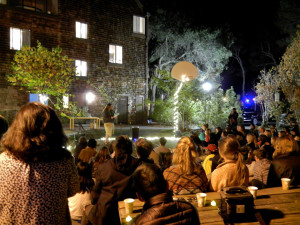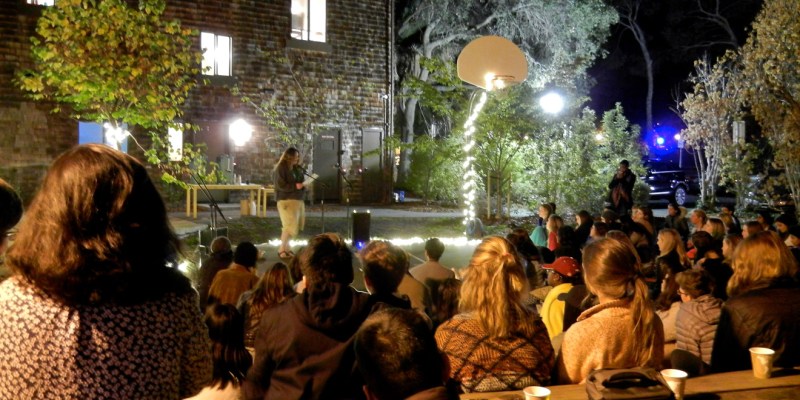The Sexual Assault Prevention committee of the Associated Students of Stanford University (ASSU) partnered with the Spoken Word Collective to organize an open mic event, called “(Un)filtered,” on gender violence, sexual assault and identity last Wednesday, Nov. 4. The event comes at a time during which the University is also reviewing a proposed updated judicial process for sexual assault.

ASSU Sexual Assault Prevention committee
This year’s co-chairs of the ASSU’s Sexual Assault Prevention committee, Tanvi Jayaraman ’16 and Hannah Long ’16, have decided to partner with various organizations on campus for their events over their term. They plan to follow a model in which they would concentrate on collaborating with those who are experts in their fields so as to present a more effective presentation.
The open mic night was a platform for individuals to share stories about gender identity, gender-based violence and similar concepts.
According to Jayaraman, the open mic was aimed at “creating a safe, healing space where people… could talk about their stories or simply listen” without fear of judgment. Due to the gravity and touching nature of the subjects, a professional confidential counselor from CAPS and two members from the Young Women’s Christian Association’s Sexual Assault Center at Stanford were present for people to seek professional help if needed.
“The ASSU is there to elevate the voices of the students to the University,” Jayaraman said.
She also explained that the ASSU hopes to steer the issues surrounding sexual assault towards a more community-based avenue.
“[‘(Un)filtered’] is essentially storytelling, and for many people, stories can be healing,” she said.
Alison Romero ’19, a member of the Women’s Coalition and one of the event’s attendees, said that she liked listening to people’s stories and that first hand-accounts, such as those narrated by the participants, are always a lot more powerful than lectures or talks.
Larry Liu ’16 said that the space was so comfortable that he was able to talk about a story very personal to him even though it “didn’t quite fit” into the theme.
“Being in the presence of those who had undergone those experiences made me feel empowered,” Liu said. “I came out confident in both understanding those issues and knowing that I too could fight them.”
He explained that he has observed a shift in the focus of the University administration — now concentrating more on the psychological state of mind of students instead of on alcohol policies and substance abuse, as was the case during his freshman year.
According to Jayaraman, the Sexual Assault Prevention committee also hopes to put together a peer education program for sexual assault prevention in association with residential offices and community centers. The peer educators would be part of the The Office of Sexual Assault & Relationship Abuse Education & Response (SARA) and would do outreach programs and workshops with students.
The committee’s ultimate aim is to allow for many more healing spaces on campus where students feel comfortable and safe, Jayaraman said. They want to implement primary prevention measures to tackle underlying issues that may lead to sexual assault and hope to instill in the Stanford community the importance of healthy relationships, consent and respect for other human beings.
Addressing recommendations from the Provost’s Task Force
Tangentially to the Sexual Assault Prevention committee, ASSU President John-Lancaster Finley ’16 spoke about how the University is working toward implementing suggestions from the Provost’s Task Force on Sexual Assault Policies and Practices.
Comprised of faculty members, graduate students and undergraduate students, the group was created “because of pressure put on the University administration in the aftermath of the Stand With Leah protests in 2014,” Finley said. The Task Force disbanded after the release of the recommendations last spring.
Working with the Title IX office and the Office of Community Standards, the Task Force proposed a new Title IX process that would be more unified and consistent in its process, will minimize delays when the University investigates allegations of sexual assault and sexual misconduct, and offer legal support and assistance for both parties. A panel of three trained faculty staff and graduate students will then hear the case and determine whether or not the alleged student exhibited prohibited conduct and disciplinary action should be taken. As recommended by the task force, the decision must be unanimous.
“We are working to ensure an adjudication process that is fair, consistent and equitable as part of our ongoing effort to achieve a campus environment free of sexual violence,” said Provost John Etchemendy to the Stanford News Service in an announcement released on Monday. “The proposed process also represents a significant investment of resources by the University in new staff and support resources that will be available to students participating in the process.”
The Task Force recommendations also include the creation of The Confidential Support Team, administratively run by Vaden Health Center, to satisfy the demand for more sexual assault support resources. Another recommendation to increase the budget for prevention education has been proposed to the University Budget Group.
“This [increased budget] should result in the hiring of a new Senior Associate Vice Provost for Gender Diversity & Inclusion, who will oversee all Title IX-related processes within the University,” Finley said.
“[The ASSU aims to] continue the spirit of the Task Force’s work — to identify ways to improve education and response so that the institution of Stanford can become an intellectual, cultural and academic leader in combating the crisis of sexual violence on college campuses,” he added.
The University is currently taking comments on this proposed process and hopes to implement the new process in a pilot program in the winter.
Contact Simar Malhotra at simar ‘at’ stanford.edu.
